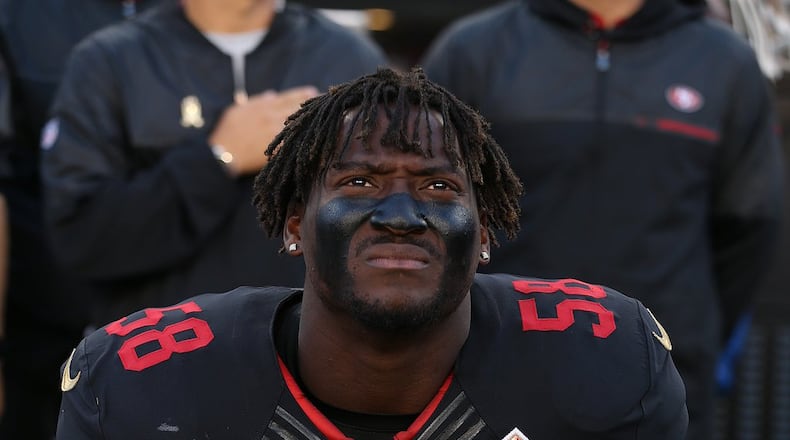Young people often get branded as narcissists who spend their lives puckering and pouting for Instagram. So, why do we complain when they embrace a cause and take a knee instead of a selfie?
High school athletes kneeling during the national anthem to protest police brutality against minorities are following San Francisco 49er Colin Kaepernick’s lead, and drawing the same fire as the NFL quarterback. The reactions are heated. In last week’s game in Buffalo, Bills’ fans booed Kaepernick while vendors outside the stadium hawked shirts with his image in the crosshairs of a rifle scope.
When the AJC reported Cobb County Schools Superintendent Chris Ragsdale’s comment that, if student athletes took a knee during the national anthem, “their asses would be benched,” social media applauded. Among the comments: “Love it. Ragsdale for President,” “Yay, bench them all,” “I hope he follows through. It’s time to put a stop to that treasonous nonsense.” (Cobb later said athletes would not be punished for exercising their First Amendment rights.)
But Kaepernick’s protest is not a show of disloyalty or disdain, according to former black athletes who also staged public protests.
At a Morehouse College panel earlier this month on race, sports and the activist athlete, 1968 Olympic medalist John Carlos, who, along with fellow American medalist Tommie Smith, raised a black-gloved fist from the podium in Mexico City, said he felt duty-bound to use that moment to condemn racism. And while he paid a lifelong price for his actions, Carlos said he does not regret what he did, nor should Kaepernick.
As a child in Harlem, Carlos met baseball legend Jackie Robinson and saw the racism that even a superstar African-American athlete endured in America. It made a lasting impression. “I have been on a crusade all my life,” Carlos said. “It took me to Mexico City with no hesitation. If you have to step up and make a decision to set a precedent, there is no room for hesitation. There is no room for neutrality. My advice to the athletes speaking out is to stand fast.”
Carlos and Smith returned home to scorn — sportswriter Brent Musburger called them “black-skinned storm troopers”— and deaths threats for their actions on the medal stand. What Carlos did nearly 50 years ago and what Kaepernick began to do 57 days ago can jeopardize careers, according to several pro athletes, advocates and sports industry leaders at the Morehouse event.
“There was no one in our camp that would have told Colin to take the knee,” said sports marketing executive Carlos Fleming, whose clients include Kaepernick, Venus Williams and Cam Newton. “He could have been cut that Monday. If he played for Jerry Jones, he would have been cut Monday.” (The Dallas Cowboys owner criticized football players taking a knee.)
“You don’t do what these men have done unless you care tremendously about America,” said civil rights activist Harry Edwards, a professor emeritus of sociology at the University of California, Berkeley, and author of “The Revolt of the Black Athlete.” Edwards has counseled athletes, including John Carlos and Colin Kaepernick, on how to harness their celebrity to address injustice and prepare them for the fallout.
“You don’t sit down and rationally decide I am going to fight this. Your battle will pick you,” said Edwards. When athletes ask what their role should be, Edwards advises them to study the issue and, if they commit to a public stand, resolve, “It is up to me to win this battle because it means those who come after me will not have to fight the battle I should have fought and fight the one facing them.”
About the Author
Keep Reading
The Latest
Featured



